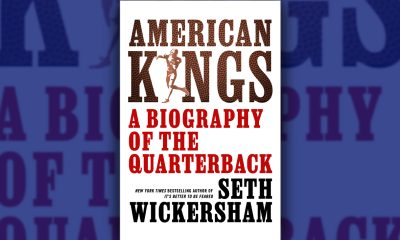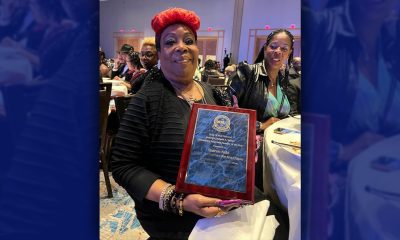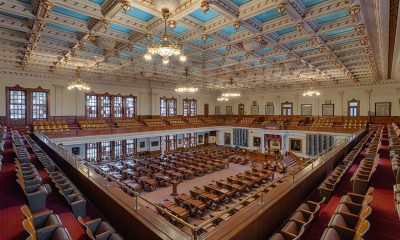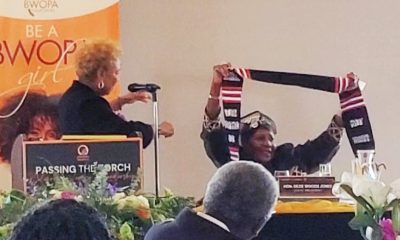Bay Area
Black, Vulnerable and Trafficked – Who’s Buying Black Girls?
Although California Senate Bill 357 was intended to alleviate arrests of willing sex workers under anti-loitering laws, it opened a Pandora’s box loophole that hinders the ability of law enforcement to halt human trafficking, especially of young Black and Brown girls. This segment explores who is ‘buying’ people for sex exploitation.

By Tanya Dennis and Vanessa Russell
Although California Senate Bill 357 was intended to alleviate arrests of willing sex workers under anti-loitering laws, it opened a Pandora’s box loophole that hinders the ability of law enforcement to halt human trafficking, especially of young Black and Brown girls. This segment explores who is ‘buying’ people for sex exploitation.
The overlying unintended effect of SB 357 is that it gives priority to the needs of the person ‘buying’ sex over the predicament of those forced into the sex trade through human trafficking.
In Part 1, the Post shared that 40% of the victims of human trafficking in our nation are Black women and girls.
This statistic is alarming especially when we look at who is ‘buying’ them. A 2006 online research project by Commercial Sexual Exploitation of Children (CSEC) revealed the following ‘buyer’ demographics: 99% of the buyers are men; 86% are 26 and older; 42% earned more than $50,000 a year; 29% graduated from college; 69% are employed and 49% are married.
The public wonders if ‘buyers’ are consciously purchasing Black girls and women or if they are merely purchasing whoever is available. Top search results on sites like Pornhub, reveal that demand for Black bodies is intentional. Black girls are in the top three search results for Pornhub and other exploitative sites.
In 2020, Pornhub was investigated for showing 118 videos of confirmed cases of child abuse and human trafficking and hosting videos titled “Black Slave” and “Black Slave Pleasures White Master.” In one case, a set of videos with this theme was watched 527,000 times and received 70% ‘thumbs up’ from the viewers. These racist themes confirm that the purchase of Black girls for the purpose enslavement is part of the ‘buyer’s’ fantasy.
Several different approaches have been attempted to deter sex buying. In the mid-1970s, the Oakland Police Department engaged in reverse stings, placing an undercover female officer on a street corner to catch buyers in the act.
Convicts had their vehicles seized and paid fees of up to 20% of the cost of the vehicle as well as towing and storage fees. “Between 1997 and 1999 the Oakland City Attorney seized and impounded over 350 vehicles.”
A federal court later ruled that seizure ordinances violated state laws. One interesting point from this program that holds true today is that 60% of those who were caught buying sex were not from Oakland.
Other Oakland approaches to deterring sex buying included getting buyers fired from their jobs and placing buyers on neighborhood ‘stay-away’ lists. The EPIK Project, which is devoted to disrupting the demand for sex trafficking and increase the capacity of law enforcement, attempted to solve sex buying by creating a decoy trafficking site which was accessed up to 40,000 times a month and using it to engage with buyers and have men speak with them about their behaviors.
In 2014, Oakland attempted to address demand by launching a Buyer Shaming website. Then in 2016, the Alameda County CEASE (Cities Empowered Against Sexual Exploitation) Network and the City of Oakland launched a coalition and a tool titled ReportJohn.org, which was based on the “Dear John” initiative by Oakland non-profit East Bay Asian Youth Center (EBAYC) that sent a letters to the registered owner of every car that neighbors reported as trolling for sex.
Melissa Farley, a Bay Area trafficking expert and researcher, studied a group of sex buyers in Boston. She found that individuals who purchased sex feared female rejection and endorsed rape myths, such as the belief that “prostitution reduces the likelihood of rape.”
These men revealed their violent tendencies toward women, sharing that they would “force a woman to have sex or rape them if they could get away with it, and engaged in sexually aggressive behavior with very little empathy for the exploited, believing that “prostituted women are intrinsically different from other women.”
One buyer comment perfectly and horrifically summarizes buyer sentiment toward the women and girls he purchased. He said the transaction is like disposing of a coffee cup after you’ve finished drinking it, “When you’re done, you throw it out.”
Buyer diversion programs — like those provided to domestic violence perpetrators bring survivors in to tell their story in hopes of creating a more human narrative in the minds of buyers — have been successfully rolled out in Fresno and Orange County resulting in very low recidivism rates.
When the group of buyers from the Boston study were asked what would change their behavior, a few said a fee and a few days in jail would be enough of a deterrent. One hundred percent said that a 30-day jail stay would deter their buying behavior completely.
Tanya Dennis, is CEO Adamika Village and serves on the Board of Oakland Frontline Healers (OFH). Vanessa Russell, the author of “Love Never Fails Us,” is the COO of the Violence Prevention Coalition and a member of OFH
Activism
OP-ED: AB 1349 Puts Corporate Power Over Community
Since Ticketmaster and Live Nation merged in 2010, ticket prices have jumped more than 150 percent. Activities that once fit a family’s budget now take significant disposable income that most working families simply don’t have. The problem is compounded by a system that has tilted access toward the wealthy and white-collar workers. If you have a fancy credit card, you get “presale access,” and if you work in an office instead of a warehouse, you might be able to wait in an online queue to buy a ticket. Access now means privilege.

By Bishop Joseph Simmons, Senior Pastor, Greater St. Paul Baptist Church, Oakland
As a pastor, I believe in the power that a sense of community can have on improving people’s lives. Live events are one of the few places where people from different backgrounds and ages can share the same space and experience – where construction workers sit next to lawyers at a concert, and teenagers enjoy a basketball game with their grandparents. Yet, over the past decade, I’ve witnessed these experiences – the concerts, games, and cultural events where we gather – become increasingly unaffordable, and it is a shame.
These moments of connection matter as they form part of the fabric that holds communities together. But that fabric is fraying because of Ticketmaster/Live Nation’s unchecked control over access to live events. Unfortunately, AB 1349 would only further entrench their corporate power over our spaces.
Since Ticketmaster and Live Nation merged in 2010, ticket prices have jumped more than 150 percent. Activities that once fit a family’s budget now take significant disposable income that most working families simply don’t have. The problem is compounded by a system that has tilted access toward the wealthy and white-collar workers. If you have a fancy credit card, you get “presale access,” and if you work in an office instead of a warehouse, you might be able to wait in an online queue to buy a ticket. Access now means privilege.
Power over live events is concentrated in a single corporate entity, and this regime operates without transparency or accountability – much like a dictator. Ticketmaster controls 80 percent of first-sale tickets and nearly a third of resale tickets, but they still want more. More power, more control for Ticketmaster means higher prices and less access for consumers. It’s the agenda they are pushing nationally, with the help of former Trump political operatives, who are quietly trying to undo the antitrust lawsuit launched against Ticketmaster/Live Nation under President Biden’s DOJ.
That’s why I’m deeply concerned about AB 1349 in its current form. Rather than reining in Ticketmaster’s power, the bill risks strengthening it, aligning with Trump. AB 1349 gives Ticketmaster the ability to control a consumer’s ticket forever by granting Ticketmaster’s regime new powers in state law to prevent consumers from reselling or giving away their tickets. It also creates new pathways for Ticketmaster to discriminate and retaliate against consumers who choose to shop around for the best service and fees on resale platforms that aren’t yet controlled by Ticketmaster. These provisions are anti-consumer and anti-democratic.
California has an opportunity to stand with consumers, to demand transparency, and to restore genuine competition in this industry. But that requires legislation developed with input from the community and faith leaders, not proposals backed by the very company causing the harm.
Will our laws reflect fairness, inclusion, and accountability? Or will we let corporate interests tighten their grip on spaces that should belong to everyone? I, for one, support the former and encourage the California Legislature to reject AB 1349 outright or amend it to remove any provisions that expand Ticketmaster’s control. I also urge community members to contact their representatives and advocate for accessible, inclusive live events for all Californians. Let’s work together to ensure these gathering spaces remain open and welcoming to everyone, regardless of income or background.
Activism
Oakland Post: Week of December 31, 2025 – January 6, 2026
The printed Weekly Edition of the Oakland Post: Week of – December 31, 2025 – January 6, 2026

To enlarge your view of this issue, use the slider, magnifying glass icon or full page icon in the lower right corner of the browser window.
Activism
Big God Ministry Gives Away Toys in Marin City
Pastor Hall also gave a message of encouragement to the crowd, thanking Jesus for the “best year of their lives.” He asked each of the children what they wanted to be when they grow up.

By Godfrey Lee
Big God Ministries, pastored by David Hall, gave toys to the children in Marin City on Monday, Dec. 15, on the lawn near the corner of Drake Avenue and Donahue Street.
Pastor Hall also gave a message of encouragement to the crowd, thanking Jesus for the “best year of their lives.” He asked each of the children what they wanted to be when they grew up.
Around 75 parents and children were there to receive the presents, which consisted mainly of Gideon Bibles, Cat in the Hat pillows, Barbie dolls, Tonka trucks, and Lego building sets.
A half dozen volunteers from the Big God Ministry, including Donnie Roary, helped to set up the tables for the toy giveaway. The worship music was sung by Ruby Friedman, Keri Carpenter, and Jake Monaghan, who also played the accordion.
Big God Ministries meets on Sundays at 10 a.m. at the Mill Valley Community Center, 180 Camino Alto, Mill Valley, CA Their phone number is (415) 797-2567.
-

 Activism4 weeks ago
Activism4 weeks agoDesmond Gumbs — Visionary Founder, Mentor, and Builder of Opportunity
-

 Activism4 weeks ago
Activism4 weeks agoFamilies Across the U.S. Are Facing an ‘Affordability Crisis,’ Says United Way Bay Area
-

 Alameda County4 weeks ago
Alameda County4 weeks agoOakland Council Expands Citywide Security Cameras Despite Major Opposition
-

 Alameda County4 weeks ago
Alameda County4 weeks agoBling It On: Holiday Lights Brighten Dark Nights All Around the Bay
-

 Activism4 weeks ago
Activism4 weeks agoBlack Arts Movement Business District Named New Cultural District in California
-

 Activism4 weeks ago
Activism4 weeks agoLu Lu’s House is Not Just Toying Around with the Community
-

 Activism4 weeks ago
Activism4 weeks agoOakland Post: Week of December 17 – 23, 2025
-

 Black History3 weeks ago
Black History3 weeks agoAlfred Cralle: Inventor of the Ice Cream Scoop




















































